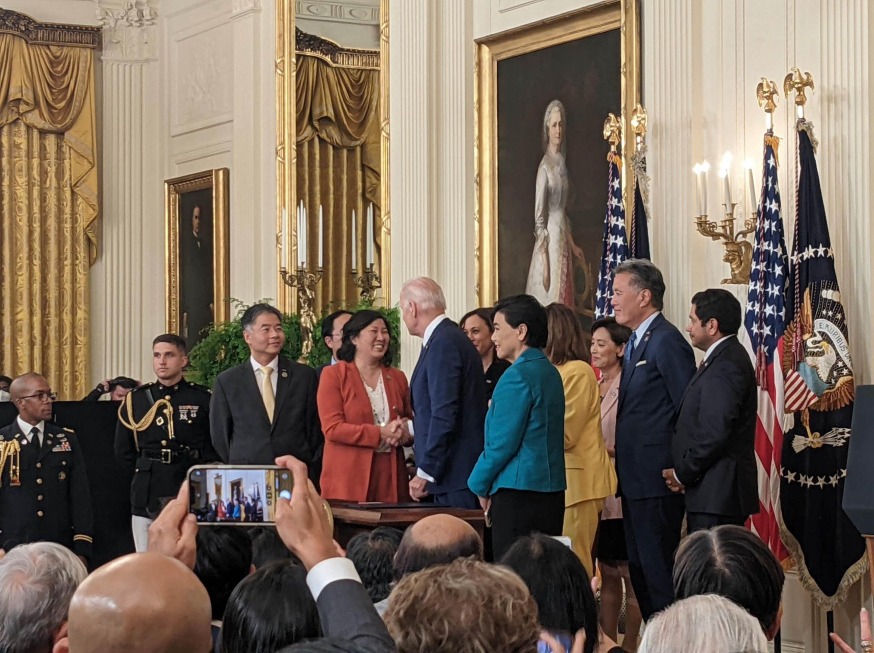
Rep. Grace Meng joined President Biden at the White House Monday as he signed her bill that seeks to create the first national museum dedicated to preserving the history and culture of Asian Americans and Pacific Islanders (Photo courtesy of Rep. Grace Meng)
June 15, 2022 By Czarinna Andres
Rep. Grace Meng joined President Biden at the White House Monday as he signed her bill that seeks to create the first national museum dedicated to preserving the history and culture of Asian Americans and Pacific Islanders (AAPIs).
Meng’s bipartisan legislation unanimously passed both houses of Congress. The bill passed the House of Representatives in April and the Senate in May, during Asian Pacific American Heritage Month.
“I am ecstatic and overjoyed at this historic moment and honored and proud to have championed this crucial effort, especially after fighting for this legislation in Congress over the past seven years,” Meng said.
“I thank and commend President Biden for signing my bill into law and understanding the importance of establishing a national AAPI museum. Since the beginning of his administration, President Biden has proven to be a true friend and ally of the Asian American and Pacific Islander community.”
Also attending the signing ceremony were Vice President Kamala Harris and several other lawmakers and organizations that supported the legislation.
Meng’s bill will follow a similar path used to create the National Museum of African American History and Culture which opened in 2016, and the National Museum of the American Latino and National Women’s History Museum, both of which are in the process of being established.
Meng said that Asian Americans and Pacific Islanders have been pivotal to the U.S.’s growth since its founding.
“We have helped make the United States the greatest country in the world, but unfortunately many remain unaware of the crucial role we’ve played throughout our history,” she said. “It’s time for that to change and creating a national museum would ensure there is a physical space to commemorate and share our story with future generations.”
Her legislation, titled the “Commission to Study the Potential Creation of a National Museum of Asian Pacific American History and Culture Act,” will now see the creation of a commission of experts in museum planning and/or Asian Pacific American history to examine the feasibility of establishing, funding and operating such a museum in Washington.
The commission, which will have eight members, will be given 18 months to determine the feasibility of establishing the museum and be required to complete several duties in doing so.
The commission will be required to produce a report that will detail what is needed to create the museum. The report will involve the development of a fundraising plan; the feasibility of acquiring collections for the museum; possible locations for the museum; and a legislative plan as to how to establish and construct the museum.
The commission will also be required to determine whether the museum should be part of the Smithsonian Institution, which is the world’s largest museum and research complex located in Washington.
The House Speaker, Senate Majority Leader, House Minority Leader and Senate Minority Leader will be tasked with appointing the commission’s eight members.
Meng’s legislation has been applauded by Asian American leaders from across the country.
“The passage of this bill is an important first step in recognizing the history and lived experiences of AAPI communities,” said John Yang, president and executive director at Asian Americans Advancing Justice, when the legislation was passed by the House in April. “Creating a national resource and institution dedicated to public education of Asian American and Pacific Islander histories is critical to building a more inclusive future.”
Jo-Ann Yoo, Executive Director of the Asian American Federation, said the bill’s passage was particularly important in the current day, as hate crimes against the AAPI community have risen nationwide since the onset of the pandemic.
“In the face of the continued harm inflicted on Asian Americans by hatred and ignorance, knowledge and understanding is the best balm,” Yoo said. “We believe along with Rep. Grace Meng, that a National Museum of AAPI History and Culture will help us learn from and celebrate our history, present a perspective that will help Americans bridge division, and lead to greater empathy among diverse races.”
Meng said she was happy for all Asian Americans and Pacific Islanders that her legislation has been signed into law.
“Asian Americans and Pacific Islanders have shaped our nation since its founding,” Meng said. “From the struggles we’ve endured to the accomplishments we’ve made, it’s time for more Americans, and our future generations, to know our story. And a National Museum of Asian Pacific American History and Culture would provide the physical space for people to learn how we have helped make America the country that it is today.”





